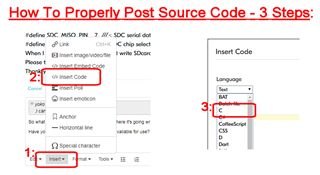I am attempting to use a one shot application timer. This works fine when I use the event handler to perform a specific task toggle an LED for example. But I would really like the time to call a set of functions that will execute a sizeable amount of code. So I have attempted to use the handler to set a flag that will be used in the main loop in with an IF statement to execute this set of functions. When I do this the event handler is called but I never return to the main while(1) loop to execute the IF statement. If I add a nrf_delay_us statement inside the while(1) main loop then the code is executed as expected. What am I missing? Why does the delay help? Code is shown below.
#include "nrf.h"
#include "nordic_common.h"
#include "boards.h"
#include "app_timer.h"
#include "nrf_drv_clock.h"
#include "nrf_gpio.h"
#include "nrf_delay.h"
// LED pin
#define LED_Pin1 17
// use a function to calculate the number of tick needed to
// create a delay of 100 millisec and store this value in LED_INTERVAL constant
#define LED_INTERVAL APP_TIMER_TICKS(50)
uint32_t count;
uint8_t timerExpired;
// For each application timer we need to create a handle which points to that instance
// so for evey application timer (Software timer) you create, you need to define a handle
// create a handle and name it as: m_app_timer_id
APP_TIMER_DEF(m_app_timer_id);
// its really important to initialize the clock other wise the app timer will not work
// so make sure you initialize it once in your code and if you are using a soft device
// then you don't need to initialize the clock as the soft device automatically initializes it.
static void lfclk_config(void)
{
// initialize the low power low frequency clock
ret_code_t err_code = nrf_drv_clock_init();
APP_ERROR_CHECK(err_code);
// request the lf clock to not to generate any events on ticks
// One tick = 1 value increment in the counter register
nrf_drv_clock_lfclk_request(NULL);
}
// create a simple handler function which will be called once the timer reaches its
// desired number of ticks value
static void app_timer_handler(void * p_context)
{
// Toggle the LED
timerExpired = true;
app_timer_start(m_app_timer_id, LED_INTERVAL, NULL);
return;
}
// a function to initialize the Application timers
static void timers_init(void)
{
// a variable to hold error value
ret_code_t err_code;
// Initialize the timer
err_code = app_timer_init();
APP_ERROR_CHECK(err_code);
// Create an application timer with the handle, mode and interrupt event handle function
err_code = app_timer_create(&m_app_timer_id, APP_TIMER_MODE_SINGLE_SHOT, app_timer_handler);
APP_ERROR_CHECK(err_code);
timerExpired = false;
}
/**
* @brief Function for application main entry.
*/
int main(void)
{
count = 0;
// initialize the gpio for led
nrf_gpio_cfg_output(LED_Pin1);
// call the function to initialize the clock
lfclk_config();
// initialize the timer by calling this function which is performing all the basic steps
timers_init();
// start the timer so that it can generate events on the desired tick value
uint32_t err_code = app_timer_start(m_app_timer_id, LED_INTERVAL, NULL);
while (true)
{
nrf_delay_us(10); //CODE in if(timerExpired == true) expression runs with this statement , but does not when this is commented out.
count = count+1;
if(timerExpired == true)
{
timerExpired = false;
nrf_gpio_pin_toggle(LED_Pin1);
}
// Do nothing.
}
}
/** @} */



